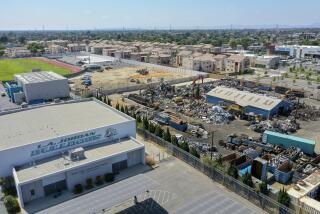Auto Salvage Firm Faces State Fine of $1,000 a Day
A state water quality control officer has decided to levy fines of up to $1,000 a day against an Anaheim operator of an auto salvage yard for failing to provide requested pollution data.
George Adams Jr., owner of Orange County Steel Salvage Inc., also has been barred from dumping shredded auto waste from his business at an Indian reservation near Parker, Ariz., because of fear of possible toxic contamination, a tribal official said Monday.
Meanwhile, as a mountain of about 40,000 tons of PCBs-contaminated waste remained on the Anaheim site--in violation of state laws on storing hazardous waste--Adams said he would ask the Anaheim City Council today for a third extension to continue storing the material.
“All the council wants to do is get this stuff out of here, and we’re doing everything humanly possible to do that,” Adams said Monday.
Civil Sanctions
However, in a tersely worded letter sent last week, James R. Bennett, Santa Ana Regional Water Quality Control Board executive officer, told Adams that his failure to submit a study of whether lead, PCBs or other potential contaminants are leaking into the soil from the shredder waste would result in civil sanctions.
“At a meeting in my office on April 30, 1986, you promised to submit the information requested within two weeks,” Bennett wrote in a May 12 letter, a copy of which was obtained by The Times.
“This is to notify you that . . . Orange County Steel Salvage Inc. will be subject to civil liability provisions for each day the study is not submitted, commencing May 14.”
A study had not been submitted by Monday, said Gerard J. Thibeault, assistant executive officer for the board overseeing water quality in most of Orange, Riverside and San Bernardino counties.
As a result, he said, Adams faces up to $1,000 a day in fines. “We can’t fully evaluate the hazard posed by this material until we get the data we have requested from Mr. Adams,” Thibeault said.
Soil Borings Due Today
Adams said he would have soil borings done today, and dismissed Bennett’s ultimatum as the result of “miscommunication” between himself and board officials.
He also said he would ask the council for a third extension of time, allowing the board time to decide at its July 7 meeting whether Adams’ privately commissioned study proves that the shredder waste--classified as marginally hazardous waste even without PCB levels of up to twice the legal limits--can be dumped safely in ordinary landfills.
The council has twice postponed ruling on the storage issue because Adams said he was close to a resolution with state health and regional water quality officials over where the waste could be dumped.
However, Thibeault said Monday that Adams’ study, by ICF Northwest of Richland, Wash., lacks necessary engineering and sample data about the waste at the Anaheim yard.
Meanwhile, on the Colorado River Indian Tribes Reservation, environmental detection officer Conner Byestewa Jr. said Monday that he will stop Adams from using the dump at the reservation’s landfill near Parker until a chemical analysis proves there are no toxic materials in the shredder waste, known in the industry as “fluff.”
A disappointed Adams confirmed that he was barred from using the reservation landfill last week after depositing about two truckloads, about 80 tons, of fluff with only trace levels of PCBs.
The insulating chemical was banned in 1976 after it was shown to cause cancer in rats and mice, and liver damage in man.
More to Read
Sign up for Essential California
The most important California stories and recommendations in your inbox every morning.
You may occasionally receive promotional content from the Los Angeles Times.










